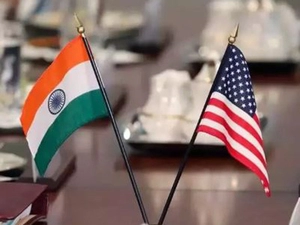According to Indian-American Congressman Ro Khanna, the United States must stand with India against China’s increasing aggressiveness. The CAATSA is a strict statute that allows the government to impose penalties on nations that buy significant amounts of Russian military gear.
With the complicated geopolitics of the time in mind, the United States House of Representatives proposed letting India off the hook for the harsh United States penalties that could be put on New Delhi for buying Russian defence equipment.

According to reports, the United States House of Representatives approved a legislative amendment by voice vote that exempts India from harsh CAATSA sanctions in exchange for buying a Russian-made S-400 missile defence system to help deter aggressors like China.
The legislation was approved on Thursday during floor discussion of the National Defense Authorization Act as a part of an en bloc (all at once) amendment (NDAA).

Congressman Ro Khanna, an Indian-American, is the author and introducer of the amendment, which calls on the Joe Biden administration to exercise its power to grant India a CAATSA waiver in order to help deter aggressors like China.
The amendment passed with a 330 to 99 margin of favour in the House. The Act must be approved by the House and the Senate in order for it to become a part of the law.
According to the PTI article, CAATSA gives the United States government the authority to impose penalties on nations that buy significant amounts of Russian defence equipment. This development took place in response to Russia’s invasion of Crimea in 2014 and its suspected interference in the 2016 United States presidential elections.
The 17th congressional district congressman for California, Ro Khanna, stated: “When China’s hostility increases, the United States must support India.”
In my capacity as vice chair of the India Caucus, I have been trying to deepen the relationship between our nations and make sure that India can protect itself along the Indian-Chinese border. I am happy to see this amendment pass the House on a bipartisan basis since it is of the highest significance.
According to Khanna, the cooperation between the United States and India is the one that is most important to United States strategic interests. He said that “my bipartisan NDAA amendment represents the most significant piece of legislation for United States-India ties out of Congress since the United States-India nuclear deal.”
The bill, which was introduced in 2017, calls for the United States government to take severe measures against any nation that conducts business with the Russian defence and intelligence industries.
It is significant to note that, in spite of a warning from the then-Trump administration that moving through with the transaction would result in United States penalties, India inked a USD 5 billion agreement with Russia in October 2018 to purchase five S-400 air defence missile systems.
Russia’s most sophisticated long-range surface-to-air missile defence system is known as the S-400. The United States has already imposed sanctions on Turkey for purchasing a number of Russian-made S-400 missile defence systems in accordance with CAATSA.

At one stage in a lengthy procedure, Biden gets the final call.
According to diplomatic sources, the amendment only “encourages” the administration of Joe Biden to approve the waiver. The modification “does not” indicate the granting of a waiver.
Under CAATSA, President Joe Biden can issue the waiver. “The amendment requesting a waiver is not a bill that must be voted on and signed into law.” The CAATSA exemption is distinct,”
If the Biden administration agrees to examine India’s request for a waiver, the United States Senate must debate and vote on the matter. Afterward, the President will sign it into law, and in the meantime, a number of procedural concerns must be resolved, according to sources.
The issue was also discussed during the most recent round of 2+2 discussions between India and the United States, held in April of this year.













